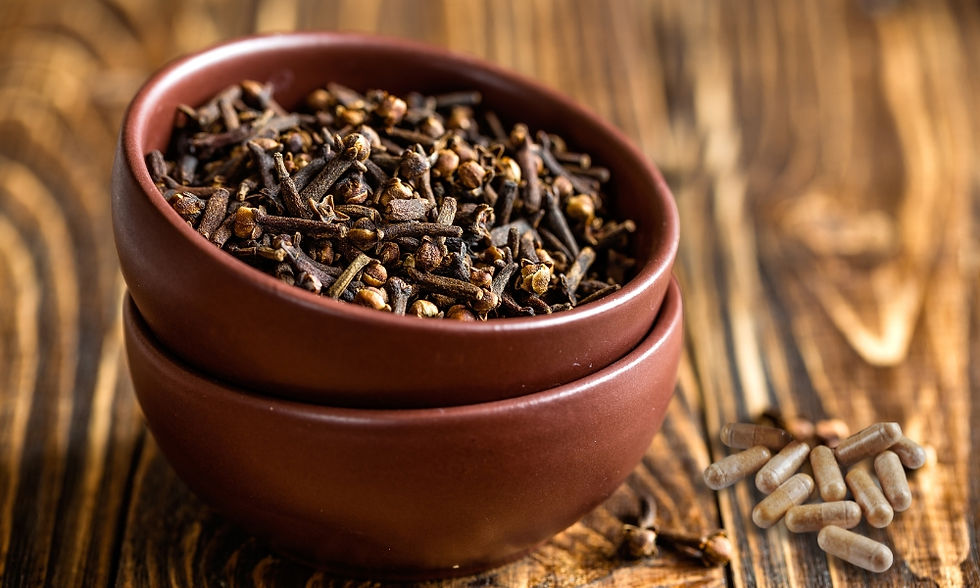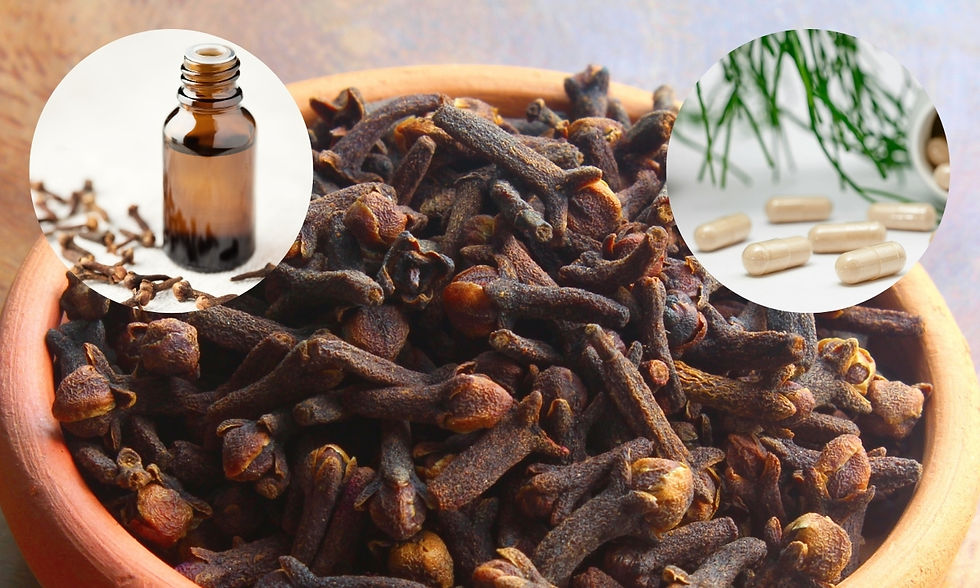Clove’s Science Unveiled: From Ancient Spice to Modern Remedy
- Herbs around us
- Sep 5, 2025
- 6 min read
Updated: Oct 23, 2025
Clove, or Syzygium aromaticum, may seem like just a humble kitchen spice, but beneath its warm, pungent aroma lies a centuries-old remedy now making waves in modern wellness circles. Whether it’s steeped in your grandma’s chai or encapsulated in your daily herbal stack, clove’s active compounds, antioxidant density, and anti-inflammatory effects are drawing serious attention from scientists, nutritionists, and conscious consumers alike.
With its roots in traditional medicine across Asia and the Middle East, clove is now available in a range of modern formats: clove capsules, organic clove powder, clove oil softgels, and even digestive nutritional supplements. But what exactly makes clove so special? And how does its ancient legacy stand up to modern research?
Let’s take a closer look at the nutritional profile, bioactive compounds, and therapeutic potential of this powerful botanical.

Image: Canva
The Phytochemical Power of Clove
Clove owes its functional value largely to its essential oil content, especially a compound called eugenol, which can make up 70%–90% of clove oil. Eugenol is more than just aromatic; it has been shown to exhibit anti-inflammatory, antimicrobial, analgesic, and antioxidant properties in both in vitro and in vivo studies.
In addition to eugenol, clove contains:
Flavonoids such as kaempferol and quercetin
Tannins, which support digestive and oral health
Terpenoids and phenolic acids, both linked to immune defense
A host of minerals like calcium, magnesium, and manganese
Vitamins C and K, essential for cellular health and blood clotting
What’s remarkable is that even small amounts of clove—especially in its concentrated form, such as clove extract or organic clove capsules - can deliver these benefits without needing high dosages.
Whole Clove vs. Clove Oil vs. Clove Supplements
To understand the full value of clove, it’s important to distinguish between its various forms. Each preparation method - whether culinary, essential oil, or encapsulated - has different benefits and applications.
Clove Form | Primary Use | Eugenol Content | Common Format | Best For |
Whole Dried Cloves | Culinary, Infusions | Low (~1%) | Whole spice, tea blend | Cooking, mild digestive support |
Clove Essential Oil | Aromatherapy, Topical Pain Relief | Very High (80%+) | Diffuser, diluted oil blends | Joint support, sinus relief, oral care |
Clove Capsules | Internal Supplementation | Moderate (~20–40%) | Capsules, softgels, gummies | Daily immune & gut health support |
Clove as a Digestive Nutritional Supplement
The use of clove in digestive wellness is not new. In Ayurvedic and Unani medicine, clove has long been prescribed to relieve bloating, nausea, indigestion, and intestinal parasites. Today, clove supplements are increasingly combined with ingredients like black walnut, wormwood, and fennel in detox and gut health blends.
Mechanisms of Digestive Support:
Stimulates digestive enzyme secretion
Reduces gut inflammation caused by bacteria and toxins
Eases flatulence and cramping
Antiparasitic properties may aid in gentle intestinal cleansing
Modern clinical trials are still limited, but in vitro data support clove’s effectiveness in reducing microbial overgrowth, including certain strains of Candida albicans. Consumers seeking natural remedies for bloating, leaky gut, or irregular digestion often turn to clove supplement capsules for gentle, plant-based support.
Immune Function and Anti-Inflammatory Potential
Beyond digestion, clove’s robust antioxidant profile makes it a compelling choice for immune health and systemic inflammation. According to a USDA study comparing antioxidant concentrations across common spices, clove ranked #1, surpassing even turmeric and cinnamon.
This antioxidant power plays a key role in:
Neutralizing free radicals that lead to chronic disease
Protecting immune cells during oxidative stress
Supporting wound healing and tissue regeneration
Reducing pro-inflammatory cytokines in the body
In particular, eugenol modulates NF-kB pathways—making it a promising compound for conditions where inflammation is a root cause. This aligns with growing demand in the U.S. for organic clove pills as part of anti-inflammatory supplement stacks.
Hormonal Balance, Libido, and Fertility
While not as well-publicized, clove has a growing reputation for its aphrodisiac and hormone-supporting effects. Preclinical studies from India and Indonesia suggest clove extract may enhance testosterone levels, sperm motility, and libido—especially when combined with warming herbs like cinnamon bark or maca root.
Clove’s role in blood circulation, detoxification, and oxidative balance also plays into overall endocrine wellness. Products like clove supplement capsules are sometimes included in men’s and women’s formulas for reproductive health or stress-induced hormonal imbalance.
Clove’s Role in Gut Microbiome Balance
Emerging research suggests that clove extract may help regulate the gut microbiota by targeting harmful pathogens while leaving beneficial bacteria intact. This selective antimicrobial action is critical because the gut microbiome is not just about digestion—it influences immunity, mood, and even metabolic health.
In particular, eugenol, the dominant compound in clove buds, has demonstrated the ability to reduce populations of Candida albicans and E. coli in laboratory settings. These microbes are often linked to gut dysbiosis and bloating. A study published in Frontiers in Microbiology (2020) confirmed that clove extract inhibited the formation of pathogenic biofilms without disturbing the diversity of beneficial gut flora.
For those struggling with irregular digestion, IBS symptoms, or bloating, a clove supplement may offer subtle but sustained relief by enhancing gut flora resilience. However, more clinical trials are needed to understand the long-term impact of cloves on human gut microbiota.
Anti-Inflammatory Power in the Digestive Tract
Chronic inflammation in the gut is often at the root of digestive discomfort, food sensitivities, and autoimmune flare-ups. Clove’s natural anti-inflammatory action helps calm these underlying issues.
In one randomized clinical trial (Phytotherapy Research, 2018), patients who consumed a polyherbal formula containing clove oil reported significantly reduced abdominal discomfort and inflammation markers. Eugenol’s ability to block prostaglandin synthesis—similar to non-steroidal anti-inflammatory drugs (NSAIDs)—makes it a standout botanical for reducing gut irritation without side effects.
Beyond eugenol, cloves also contain kaempferol, quercetin, and gallic acid—polyphenols known for supporting intestinal lining integrity. These compounds may help protect against leaky gut and related immune responses.
Clove in Parasite Cleansing Protocols
Cloves have been used for intestinal parasite cleansing for centuries in Ayurvedic and Unani medicine. In modern protocols, clove supplements are often combined with wormwood and black walnut to support natural detox cycles.
What makes cloves particularly effective? Unlike many herbs that paralyze adult parasites, clove extract targets parasite eggs, interrupting their life cycle and preventing re-infestation. This makes clove a powerful ally during parasite cleanse regimens.
A 2019 study in the Journal of Ethnopharmacology showed clove oil exerted larvicidal effects against Ascaris lumbricoides, a common roundworm. In another in vitro study, clove tincture demonstrated strong anti-protozoal activity against Giardia lamblia, with fewer side effects than synthetic drugs.
While overuse or high doses are not recommended without practitioner guidance, organic clove capsules or clove oil pills (enteric-coated) are increasingly included in seasonal detox or travel-prep regimens.
Real-World Benefits of Clove Capsules
For consumers looking to avoid the strong taste of clove tea or oils, clove supplement capsules offer a practical solution. These capsules are often:
Standardized for eugenol content
Vegan-friendly and organic
Easier to dose consistently
Free of synthetic additives
The rise in clove supplement reviews on Amazon and U.S. wellness forums reflects growing consumer interest. Many users report improvements in bloating, gas relief, stool regularity, and fewer sugar cravings after 2–3 weeks of use.
It’s important to choose US-manufactured clove supplements that meet GMP standards, and where possible, opt for formulas with clove extract (not just powder) for more potency per serving.
Suggested Use and Pairing Tips
Here’s how to safely and effectively incorporate cloves into a daily digestive support plan:
Timing: Take clove supplements with meals to support digestion.
Stacking: Combine with ginger, black cumin seed, or peppermint oil for synergistic gut benefits.
Dosage: Follow manufacturer guidelines—typically 500–750 mg/day for general digestive support, or up to 1,000 mg/day for short-term cleansing.
Always consult a healthcare provider if you are pregnant, breastfeeding, or managing chronic gut conditions.
Comparison Chart
Feature | Clove Powder | Clove Oil Capsules | Clove Extract (Standardized) |
Primary Compound | Eugenol (low %) | Eugenol (medium %) | Eugenol (high %) |
Best For | Culinary & DIY blends | Daily gut & immunity use | Therapeutic, targeted support |
Taste / Aroma | Strong, spicy flavor | Mild or enteric-coated | Neutral (encapsulated) |
Ease of Use | Moderate (measuring) | Easy | Easy |
Bioavailability | Low | Medium | High |
A Time-Tested Herb With Modern Science to Match
The ancient spice that once sparked global trade wars is now being embraced by a new generation for its digestive, immune, and anti-parasitic benefits. Whether taken as organic clove capsules, brewed into tea, or blended into detox protocols, this humble bud offers profound support for daily gut wellness.
As always, personalization is key. Some may benefit from low doses over time, while others may turn to cloves during seasonal detox or after travel. With mounting clinical support and centuries of traditional wisdom, clove continues to earn its place in modern holistic health.
References
Cowan, M. M. (1999). Plant Products as Antimicrobial Agents. Clinical Microbiology Reviews, 12(4), 564–582.
Raut, J. S., & Karuppayil, S. M. (2014). A Status Review on the Medicinal Properties of Eugenol. Natural Product Communications, 9(10), 1509–1512.
Suparmi, S. et al. (2019). Effect of Clove Extract on Giardia Lamblia. Journal of Ethnopharmacology, 243, 112088.
Rahman, S. et al. (2020). Clove Oil’s Role in Biofilm Inhibition of E. coli. Frontiers in Microbiology, 11, 567623.


